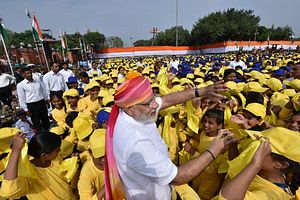“From the ramparts of the Red Fort, I want to express my gratitude to some people — the people of Balochistan, Gilgit, and Pakistan-occupied Kashmir — for the way they wholeheartedly thanked me,” remarked Indian Prime Minister Narendra Modi during his Independence Day address recently.
This was the first time that an Indian Prime Minister directly talked about trouble-prone areas under Pakistan’s control. Modi’s unprecedented statement was meant to send a clear message to Islamabad, particularly the country’s military establishment: The gloves are off.
From now on, for its espionage and jihadist games, Pakistan should expect a tit for tat response from India, which means that any sort of intervention – conventional or nonconventional – by Pakistan in Kashmir or any other part of India would be met in kind.
Clearly, Modi’s government has had enough of Pakistan’s blatant intervention in Kashmir, which has increased significantly after the death of Burhan Wani, the commander of Hizbul Mujahideen, a militant organization that operates in India-administered Kashmir. The tensions in Kashmir that followed Wani’s death have been further aggravated by Pakistan’s diplomatic pressure and its support for militants that have long waged war in Kashmir. Regardless of militant strength in the region, the recent violence in Kashmir has clearly reinvigorated the area’s militant’s propaganda machine.
The result has been a ratcheting up of tensions between the two neighboring countries. The fallout of Modi’s new hardline policy toward Pakistan is likely to be counterproductive in many ways. First, Modi’s statement appears to be an act of desperation and an attempt to divert attention away from mounting domestic problems in India. The controversy surrounding the recent Dalit protests, the violence in Kashmir, and the rising pressure from the Bharatiya Janata Party (BJP)’s hardline nationalist cadres to take a much tougher stance toward Pakistan has apparently pushed the prime minister into taking an extreme position.
Second, with this statement, Modi directly fell into the trap of the Pakistani establishment. The trap had long been laid out in the form of accusations that New Delhi had been supporting and funding separatist elements in Pakistan’s Balochistan province. A number of exiled Baloch leaders welcomed Modi’s statement, while urging other counties to join India in this regard.
From the Pakistani establishment’s perspective, however, Modi’s new position was only a confirmation of the long-held position that India, along with other regional countries, has been supporting separatists in the country’s volatile province. The Pakistani military’s consolidation of any further security presence in the province will find justification in Modi’s statement, which was also appreciated and approved by former Afghan President Hamid Karzai.
After Modi’s statement, it’s also unlikely that Pakistan is going to backtrack from its support for various Afghan- or India-focused militant groups. A week ago, for instance, the Pakistani military leadership responded to the recent Quetta attack by saying that the threat to Pakistan’s security was emanating from Afghan soil and was “being managed by Indian intelligence agencies.”
Furthermore, Modi’s Balochistan comment gives Pakistan all the more reasons to justify its actions of supporting non-state actors as strategic assets in region. It’s unlikely that New Delhi will seriously consider providing any significant financial or military assistance to Baloch separatists that can actually lead to a serious crisis between India and Pakistan. If the objective is to settle political scores with Pakistan, then it’s only going to make the lives of Baloch people more difficult, further complicating the reconciliation process in this regard.
Furthermore, after the provincial chief minister’s statement that India wants Hindu rule in Balochistan, the province’s Hindu population, which constitutes a major portion of the community’s overall population in Pakistan, could come under attack from state-supported militant groups that have reportedly been allowed by the country’s security agencies to operate and propagate freely in the province. Militant groups such as Lashkar-e-Taiba (LeT) and Jaish-e-Muhammad (JeM) have a considerable presence in Balochistan and are likely to be let loose again.
The ongoing Baloch struggle is purely indigenous and has been going on since Pakistan’s inception. The movement has survived without any foreign assistance or intervention. By using Balochistan’s unrest to respond to Pakistan’s intrusion in India-administered Kashmir, Modi only turned the issue of Kashmir, which it considers its internal matter, into an international issue.
Modi’s tough stance against Pakistan is unlikely to resolve the problems that require his immediate attention, especially the escalating tensions in Kashmir. The killings of local militants in Kashmir have always been coupled with the deaths of more innocent people. Feelings of oppression among the Kashmiri youth remain a major issue. New Delhi’s policy of resorting to the extreme use of force to quell tensions in the valley has undoubtedly complicated the militant problem there.
It was only about two weeks ago that Modi talked about the month-long spate of violence in Kashmir for the first time. For Modi, dialogue and reconciliation should be the way forward in Kashmir rather than force, which will only result in further alienation for Kashmiris from India.
Above all, rest assured that with his Balochistan comment, Modi has put Pakistan in the driver’s seat. Expect Islamabad’s propaganda machine to go into overdrive.
































